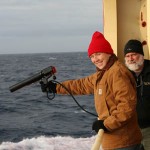As I’m writing, we are at 59 degrees south. It is plausible that the Drake passage is the source of the sailors maxim that “Below 40 degrees, there is no law. Below 50 degrees, there is no God.”
- Reny and Pat dropping an XBT in the Drake Passage
Today is day one of two crossing the Drake Passage, a 400 mile passage between Cape Horn and the Antarctic Peninsula and is one of the historically roughest parts of the world’s oceans. We were extremely lucky to avoid the roughest of weather. Initial forecasts were for 40+ knot winds and 10-12 meter seas but luckily we were able to skirt ahead of a strong high so instead we are experiencing winds of 15-20 knots with 4-meter seas. This is apparently the best you can hope for. Even in the calmer weather, the boat rocking has already led to a hand injury on board and a few people feeling queasy. Some of the crew on board have already informed us that an average of one computer commits suicide per crossing, and there is usually nothing that can be done to fix it.
Each of the team-leaders and the chief scientists had a meeting with the crew today describing the operations we have planned. The process was a good discussion back and forth that truly drilled home the fact that a few scientists will be in small, 19 foot zodiacs for up to 8 hours a day in extremely cold Antarctic conditions – a real test for those of us not named Ari or Meng (the veteran Antarctic researchers in our group). More importantly, it also made clear just how unique and groundbreaking our research will be. Not only will we be the first people to play Rock Band II in the Antarctic (as far as we know), but this project is one of the first attempts at multi-scale interdisciplinary research. We plan on examining the food webs from both the top and bottom looking at how phytoplankton influences krill and consequently whale predators around the Antarctic Peninsula. Also, we want to examine consumption rates of individual whales and to examine the shape of krill swarms in the absence and presence of predators. I am very impressed with our scientific team and think we’ll work well together throughout the cruise. That said, we still had to leave a number of folks behind that will definitely be missed.
From a scientific standpoint, there’s not much to write about yet. Although our science hasn’t yet begun, a number of us have volunteered on a project dropping XBTs throughout our crossing of the Drake passage. An XBT is an expendable bathy-thermograph that consists of a lead weight dropped up to 2500m trailing copper wire and measuring temperature as it falls through the water column. Because the Gould takes a similar trip across the Drake each trip to Palmer Station, it’s a very interesting long term dataset.
I also wanted to give you a quick introduction to some of the Raytheon employees aboard that will be helping us complete our scientific goals. The scientific crew include the Marine Techs (Chance, Dan, Julie, and Toby) who are in charge of many of the deck operations including small boat driving which is instrumental in our project, the Marine Science Technicians (Melissa and Lindsey) who help with all chemicals and samples stored on board, and the ETs (Victor and George). They are all overseen by Jamee the Marine Project Coordinator; it is amazing how receptive and excited the crew have been throughout the preparations. Often, they are asking us how they can help before we can even begin looking for them to help us.
Thanks for reading and keep up to date by following us on the blog! Feel free to email me with any questions or comments at elliott.hazen@lmg.usap.gov.


Sounds Awesome
note to Andy and Dave… sounds like awesome start of the expedition. more pics, more pics!
best tom
Great Commentary
As a veteran parent of a veteran Antartic Explorer, I’ve followed websites like this before. Great commentary…and agree with Tom…more pictures please. I’ve never read better feedback about the voyage (and Ari hasn’t contributed a word yet), and I sense the best and most exciting stuff is yet to come. Be safe, be warm and be productive. Regards, Gary